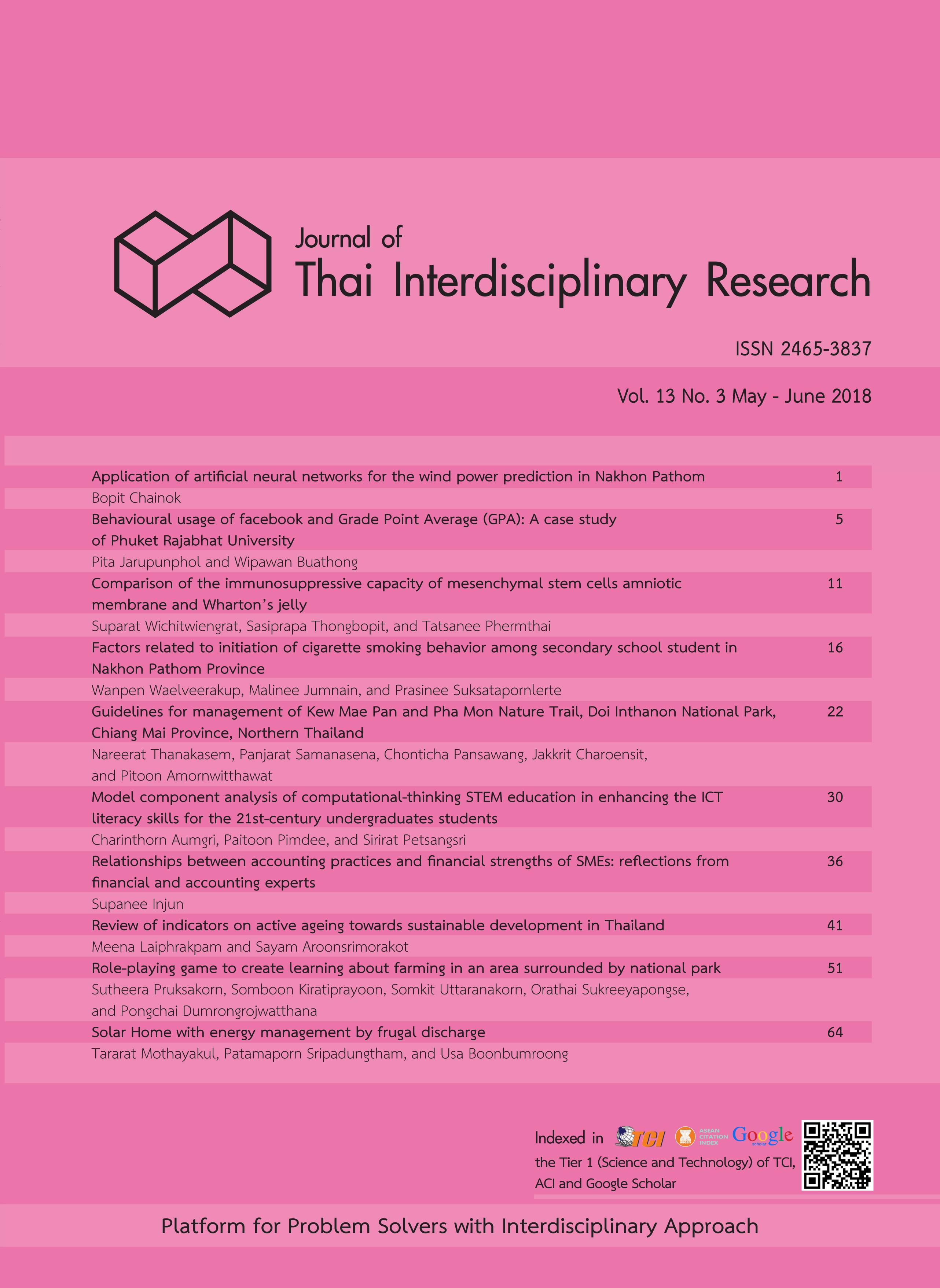Behavioral Usage of Facebook and Grade Point Average (GPA): A Case Study of Phuket Rajabhat University
Main Article Content
Abstract
Article Details
References
Mahmood, S. and Farooq, U. Facebook addiction: A study of big-five factors and academic performance amongst students of IUB. Global Journal of Management and Business Research: E-Marketing. 2014; 14(5): 2249–4588.
Pempek, T. A., Yermolayeva, Y. A., and Calvert, S. L. College students’ social networking experiences on Facebook. Journal of Applied Developmental Psychology. 2009; 30: 227–238.
Ryan, T. and Xenos, S. Who uses Facebook? an investigation into the relationship between the big five, shyness, narcissism, loneliness, and Facebook usage. Computers in Human Behavior. 2014; 27(5): 1658–1664.
Sherman, E. Facebook Addiction: Factors Influencing an Individual’s Addiction. Boston: University of Massachusetts; 2011.
Echeburua, E. and de Corral, P. Addiction to new technologies and to online social networking in young people: A new challenge. Adicciones. 2010; 22(2): 91–95.
Kuss, D. J. and Griffiths, M. D. Excessive online social networking: Can adolescents become addicted to facebook? Education and Health. 2011; 29(4): 63–66.
Balci, S. and Golcu, A. Facebook addiction among university students in turkey: “selcuk university example”. Journal of Turkish Studies (Turkiyat Arastirmalari Dergisi). 2013; 34: 255–278.
Davis., F. D. A technology acceptance model for empirically testing new end-user information systems: theory and results. Sloan School of Management: Massachusetts Institute of Technology; 1986.
Davis., F. D. Perceived usefulness, perceived ease of use, and user acceptance of information technology. MIS Quarterly. 1989; 13(3): 319–340.
Davis, F. D. User acceptance of information technology: system characteristics, user perceptions and behavioral impacts. International Journal of Man-Machine Studies. 1993; 38(3): 475–487.
Fishbein, M. and Ajzen, I. Belief, Attitude, Intention, and Behavior: An Introduction to Theory and Research. MA: Addison-Wesley; 1975.
Ajzen, I. and Fishbein, M. Understanding attitudes and predicting social behavior. New Jersey: PrenticeHall; 1980.
Ajzen, I. Theory of planned behavior. Organizational Behavior and Human Decision Processes. 1991; 179-211.
Davis, F. and Venkatesh, V. A critical assessment of potential measurement biases in the technology acceptance model: three experiments. International Journal of Human - Computer Studies. 1996; 45: 19–45.
Davis, F. D., Bagozzi, R. P., and Warshaw, P. R. User acceptance of computer technology: A comparison of two theoretical models. Management Science. 1989; 35(8): 982–1003.
Chen, H., Hsu, C., Chang, C., and Huang, Y. Applying the technology acceptance model to evaluate the learning companion recommendation system on facebook. Proceedings of Technology for Education (T4E), IEEE. 2012; 160–163.
Khalid, A., Bashir, S. S., Razi, A., and Ali, S. A. Trend of using facebook among teenagers. Global Journal of Management and Business Research. 2012; 12(2): 49–55.
Nasri, W. and Charfeddine, L. An exploration of Facebook.Com adoption in Tunisia using technology acceptance model (TAM) and theory of reasoned action (TRA). Interdisciplinary Journal of Contemporary Research in Business. 2012; 4(5): 948–968.
MedicalXPress. New research about facebook addiction [internet]. 2012. [cited 30 April 2017] Available from: http://medicalxpress.com/news/2012-05-facebook-addiction.html
Clark-Carter., D. Quantitative Psychological Research: The Complete Student’s Companion. Psychology Press; 2009.
Hoyle, R. H. Structural Equation Modeling: Concepts, Issues, and Applications. SAGE; 1995.
Hoyle, R. H. Handbook of Structural Equation Modeling. New York: Guilford Press; 2012
Hox, J. An introduction to structural equation modeling. Family Science Review. 1998; 11: 354–373.
Teo, T. and Khine, M. S. Structural Equation Modeling in Educational Research: Concepts and Applications. Boston: Sense Publishers; 2009.


